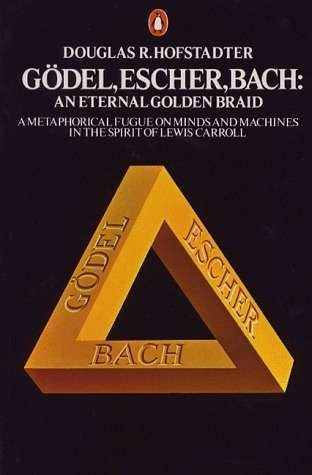
Godel, Escher, Bach: An Eternal Golden Braid by Douglas Hofstadter
Check my rate
| Main centres: | 1-3 business days |
| Regional areas: | 3-4 business days |
| Remote areas: | 3-5 business days |

| Main centres: | 1-3 business days |
| Regional areas: | 3-4 business days |
| Remote areas: | 3-5 business days |
Published by Penguin Books,1979, softcover, illustrated, illustrated, index, 772 pages, condition: new.
Linking the music of J.S. Bach, the graphic art of Escher and the mathematical theorems of Gödel, as well as ideas drawn from logic, biology, psychology, physics and linguistics, Douglas Hofstadter illuminates one of the greatest mysteries of modern science: the nature of human thought processes.
His momentous and by now famous book has much in common with the works of Lewis Carroll. Lucid and witty, drawing together an astonishing range of ideas, it is at once an entertainment, a brilliant literary achievement and a triumph of the imagination.
As I work my way through this dense book, I am reminded of the Zen tale of 4 blind men and an elephant. To settle a dispute between townspeople over religion, the Zen master had 4 blind men and an elephant led in. With the men not knowing its an elephant, the Zen master had each feel a part of the elephant. Each blind man gave a varying but inaccurate guess of what it was he felt. In conclusion, the Zen master exclaimed that we are all like blind men. We have never seen God, but can only guess based on our subjective feeling.
In much the same way, each chapter in GEB is like feeling a part of an elephant. Hopefully, by the time we touched each part, we have a good idea of what the book is about. Here is my laymans take on what that elephant is, filtered by my interest in human cognition.
Gödel, Escher and Bach
The heart of this book is these Strange Loops that represent the activities inside our brains that turn into consciousness. GEB uses art and music, in combination with math and computing, to illustrate these self-referential loops. The mechanic of the loops is represented by the works of the mathematician Kurt Gödel, the artist M.C. Escher, and the musician J.S. Bach. Kurt Gödels Incompleteness Theorem shows that a formula is unprovable within its axiomatic system. Gödels usage of mathematical reasoning to analyze mathematical reasoning resulted in self-referential loopiness, basically saying a formula cannot prove itself. M.C. Escher creates visual presentations of this loopiness in his Waterfall and Drawing Hands.
Finally, J.S. Bachs Musical Offering were complex puzzles offered to King Frederick the Great in the form of canons and fugues. A simple description of a canon would be a theme that played against itself, such as in Row, Row, Row Your Boat.